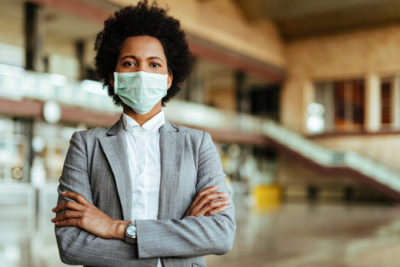Essential Workers are at some of the highest risks of contracting COVID-19. Safety in the workplace is important because some essential workers have contracted COVID-19 at work. These workers expressed their fears and concerns about workplace safety during the pandemic.
Nina, an essential worker at a suburban bank, has valid concerns regarding COVID-19 safety protocols in the workplace. Nina confirms her employer does have protocols in place, but they are inadequate. The staff at the bank are required to wear masks, clean their workstations, and practice social distancing. Nina notes she does practice social distancing when applicable. Still, the layout of her workplace does not allow the recommended 6ft distance in all areas. According to Nina, workplace maintenance is not up to par. Employees are asked to clean their workstations frequently but do not have the adequate number of needed supplies. The staff needs more supplies to keep the areas clean for themselves and customers. Employees use sick days and vacation time if they need to quarantine. Nina does the best that she can in her current situation and makes it a point to be extra careful.
 Essential worker, Raven, is currently employed as a patient screener at a hospital. As a patient screener, Raven asks patients questions regarding their visit. The hospital staff is overwhelmed and exhausted with the number of patients that they assist daily. They are also frustrated with issues of understaffing at the hospital as well. Raven and the other patient screeners often provide more than the typical screener because there is not adequate staff available. They assist patients with their appointments, transportation needs, and keeping the lobby traffic flow as smooth as possible with a large number of patients. If the hospital administration could focus on staffing vulnerable areas, it would help. Additional staff members could help minimize the amount of time the staff has to interact with patients during this pandemic. Increasing the team will help reduce exposure to potential COVID-19 patients, employee burnout, and low morale.
Essential worker, Raven, is currently employed as a patient screener at a hospital. As a patient screener, Raven asks patients questions regarding their visit. The hospital staff is overwhelmed and exhausted with the number of patients that they assist daily. They are also frustrated with issues of understaffing at the hospital as well. Raven and the other patient screeners often provide more than the typical screener because there is not adequate staff available. They assist patients with their appointments, transportation needs, and keeping the lobby traffic flow as smooth as possible with a large number of patients. If the hospital administration could focus on staffing vulnerable areas, it would help. Additional staff members could help minimize the amount of time the staff has to interact with patients during this pandemic. Increasing the team will help reduce exposure to potential COVID-19 patients, employee burnout, and low morale.
Gloria is an essential worker currently trying to balance several front-line positions. As a single Mom of five children, Gloria is juggling several jobs to make ends meet during the pandemic. She currently works as a home health care provider and uber eats delivery driver. Gloria’s top priority is staying safe not only for her family but for her patients as well. As the sole provider, Gloria must work every day to ensure her family has the essentials, including rent, utilities, food, and toiletries. In Gloria’s case working from home is not an option; she must see her clients in-person as a home health care provider and uber driver. In addition to the work stress, she is overly concerned about remote learning for her young children. Her children used to be excited about getting up every day and going to school. They enjoyed learning in a classroom setting and interacting with their peers. Now her younger children are sad, less social, and anxious about being indoors all the time. Gloria notes the stress and trauma of going out every day, risking her life to make an honest living for her family. The COVID-19 epidemic has caused more problems than many may realize. Gloria hopes to receive some financial assistance to help curve the financial stress that the pandemic has caused. The extra funds could reduce the stress associated with worry and the stress of not making ends meet.
 Employers have a massive task of making the workplace safe and productive for essential workers during the COVID-19 pandemic. These essential workers admit they are stressed and overwhelmed. Many essential workers cannot entertain the idea of taking the COVID-19 vaccine because of their daily stresses of worrying about their basic needs. It is difficult to consider the benefits of a vaccine when essential workers are stressed out, mentally exhausted, and uninformed. These workers feel medical professionals must do a better job of reaching out to a larger segment of the population to dispel the COVID-19 vaccine myths.
Employers have a massive task of making the workplace safe and productive for essential workers during the COVID-19 pandemic. These essential workers admit they are stressed and overwhelmed. Many essential workers cannot entertain the idea of taking the COVID-19 vaccine because of their daily stresses of worrying about their basic needs. It is difficult to consider the benefits of a vaccine when essential workers are stressed out, mentally exhausted, and uninformed. These workers feel medical professionals must do a better job of reaching out to a larger segment of the population to dispel the COVID-19 vaccine myths.
Theresa Horton is a freelance writer living in Chicago. Follow her on her social media @passionateresources.